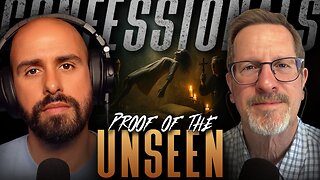Premium Only Content

Episode 1838: How much is our soul really worth? Will prayer help?
Throughout Sacred Scripture, we find that when God’s people fast, the power of their prayers is increased, especially when they are engaged in spiritual warfare.
Isaiah 58:6
"Is not this rather the fast that I have chosen? loose the bands of wickedness, undo the bundles that oppress, let them that are broken go free, and break asunder every burden."
In the New Testament, we find that Jesus fasted for forty days and nights in the wilderness in preparation for His battle with Satan, who came to tempt Him
Luke 4:1-2
"And Jesus being full of the Holy Ghost, returned from the Jordan, and was led the Spirit into the desert, for the space of forty days; and was tempted by the devil. And he ate nothing in those days; and when they ended, he was hungry."
If prayer is a spiritual weapon, fasting is the spiritual whetstone on which it is sharpened. It’s the spiritual muscle that, when exercised regularly, strengthens the thrust of that weapon to pierce the Enemy and drive him away.”
For the traditional Catholic church importance of prayer for the saving of one's soul is emphasized in various passages. Romans, chapter 10, verse 13, says: "For everyone who calls on the name of the Lord will be saved."
Additionally, in the Gospel of Matthew, chapter 7, verse 7, Jesus instructs his followers: "Ask and it will be given to you; seek and you will find; knock and the door will be opened to you."
Throughout the New Testament, prayer is presented as a vital aspect of the Catholic.
In the traditional Catholic interpretation of Matthew 7:7, the verse is understood as an encouragement from Jesus to his followers to persistently seek God through prayer. This verse is often interpreted within the broader context of the Sermon on the Mount, where Jesus teaches his disciples about various aspects of righteous living and the Kingdom of God.
Specifically, in Matthew 7:7, Jesus uses three imperative verbs - "ask," "seek," and "knock" - to emphasize the importance of active and persistent prayer. Catholics interpret this as an invitation to approach God with confidence and persistence, trusting in His love and willingness to respond to the prayers of His faithful.
Furthermore, the Catholic interpretation emphasizes the idea that God is a loving Father who desires to give good gifts to His children (Matthew 7:11). Therefore, Catholics are encouraged to approach God in prayer with faith and trust, believing that He will answer according to His will and for the ultimate good of His people.
Overall, in the traditional Catholic interpretation, Matthew 7:7 serves as a powerful reminder of the importance of prayer in the Christian life and the assurance that God is always ready to hear and respond to the prayers of His faithful followers.
St. Augustine: emphasized the importance of persistence in prayer. He encouraged believers to persevere in seeking God through prayer, trusting in His faithfulness to respond according to His wisdom and timing.
St. Teresa of Ávila: Teresa of Ávila, wrote extensively about prayer and the spiritual life. She stressed the importance of humility and trust in prayer, encouraging Christians to approach God with sincerity and openness of heart.
St. Francis de Sales: wrote the classic spiritual work "Introduction to the Devout Life." He taught that prayer is essential for spiritual growth and union with God. He emphasized the need for consistency and perseverance in prayer, urging believers to cultivate a deep and intimate relationship with God through regular prayer and meditation.
Necessity of Prayer: St. Francis de Sales teaches that prayer is indispensable for anyone seeking to grow in holiness and deepen their relationship with God. He emphasizes that just as the body needs food for sustenance, the soul requires prayer for its nourishment and spiritual vitality.
Types of Prayer: St. Francis de Sales discusses various forms of prayer, including vocal prayer (prayers recited aloud), meditation (reflective prayer on Scripture or spiritual truths), and contemplation (wordless prayer of resting in God's presence). He encourages readers to cultivate a balanced prayer life that incorporates these different types of prayer according to their individual temperament and spiritual needs.
Consistency and Perseverance: St. Francis de Sales stresses the importance of consistency and perseverance in prayer. He advises against seeking extraordinary mystical experiences in prayer but rather encourages faithful and regular prayer, even in times when it may feel dry or difficult. He teaches that God values the sincerity and devotion of a humble heart in prayer.
Interior Life: Central to St. Francis de Sales' teachings on prayer is the cultivation of the interior life, where the soul seeks union with God through prayer and the practice of virtue. He emphasizes the importance of self-examination, spiritual direction, and the sacraments in nurturing this interior life and growing in holiness.
Prayer of the Heart: St. Francis de Sales encourages a prayer of the heart, where the soul seeks to love God above all things and to conform its will to His. He teaches that true prayer is not merely a recitation of words but an expression of the heart's desire for union with God.
Overall, "Introduction to the Devout Life" presents a practical and accessible guide to living a life of devotion to God, with prayer as the cornerstone of spiritual growth and intimacy with the Divine. St. Francis de Sales' timeless wisdom continues to inspire and guide believers in their journey toward holiness and union with God.
Now go out and convert someone to prayer through constant examples. Let’s hear what the good father has to say about saving our souls through prayer. Good day!
-
 LIVE
LIVE
Game On!
17 hours agoBREAKING NFL NEWS: Taylor Swift and Travis Kelce Are Engaged!
4,627 watching -
 1:02:09
1:02:09
The Confessionals
20 hours agoThe Supernatural Proof You Can’t Ignore (When Angels and Demons Showed Up) | Lee Strobel
20.7K14 -
 15:24
15:24
Degenerate Jay
20 hours ago $0.11 earned5 Best Moments In Batman: Arkham Asylum
2.64K -
 12:24
12:24
The Shannon Joy Show
14 hours ago🔥From Flock Cameras to Palantir: America’s Expanding Digital Cage🔥
4.52K2 -
 LIVE
LIVE
BEK TV
23 hours agoTrent Loos in the Morning - 8/27/2025
220 watching -
 LIVE
LIVE
The Bubba Army
22 hours agoTaylor Swift & Travis Kelce ENGAGED! - Bubba the Love Sponge® Show | 8/27/25
1,747 watching -
 40:14
40:14
Uncommon Sense In Current Times
17 hours ago $1.70 earnedThe Dating Crisis in America | J.P. De Gance on the Church’s Role in Restoring Family & Faith
36.2K3 -
 12:35
12:35
Red Pill MMA
19 hours agoNow We Know The Truth.. Hero Who Stopped Raja Jackson Speaks Out
10.4K8 -
 41:04
41:04
Coin Stories with Natalie Brunell
1 day agoCooking, Culture & Crypto: Norma Chu’s Food Empire Turns Bitcoin Treasury
11.6K -
 8:03
8:03
MattMorseTV
18 hours ago $8.87 earnedThings in the UK just got INSANE...
92K138